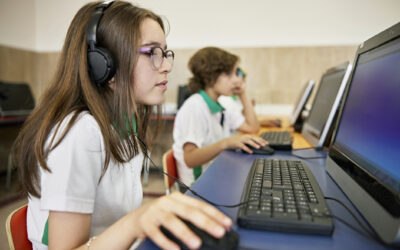While a comprehensive digital literacy curriculum is critical for student success, these essential skills can—and should—be integrated into subject-specific learning, from mathematics and history to science, literature and more. Digital infusion in these subjects can not only enhance comprehension, but also reinforce important digital literacy skills while instilling how these skills may be used outside computer classes.
How to Incorporate Digital Literacy in Subject-Specific Learning
Incorporating digital literacy into subject-specific learning can enhance a student’s understanding and engagement with the material while helping to prepare them for the digital age. Below, we share 5 ideas for incorporating digital literacy into different subjects.
1. Encourage Digital Research
The days of research garnered primarily from encyclopedias and manuscripts are over, as more and more research is completed online. However, for students to use this digital literacy tool effectively, they must practice finding sources, analyzing their quality and determining how to best utilize the information without plagiarizing or infringing on copyright.
For educators, this can mean:
- Collaborating with computer science instructors to put together or utilize digital research guidelines that support existing computer science curriculum,
- Providing digital resources such as academic databases or online libraries,
- Organizing a critical evaluation exercise where students work together to evaluate the credibility of the websites and sources they found online,
- Requiring an annotated bibliography or (more casual) digital resource journals that document the student’s research process, including the sources they used, their insights and how they plan to use that information.
2. Provide Digital Peer Collaboration Projects
Many subjects, such as geography, science and literature, require reports or presentations to demonstrate learning. Teachers of these subjects can incorporate digital literacy into their curriculum by assigning students to work together and collaborate digitally on these projects. Not only does this give students an opportunity to practice digital research, but students can also use online collaboration tools such as Google Docs, Google Jamboard, or collaborative research tools to work together on these projects.
3. Set a Riddle or Research Challenge
Teachers may ask students a riddle or complex question, then have them race to find who can discover the answer—with credible sources—first. This encourages students to figure out how to discern credible sources in different subjects while giving them an opportunity to research digitally.
Make this even more challenging (and relevant) by choosing a current event or common misconception that includes having to discern inaccurate assumptions from factual information.
4. Invite a Guest Speaker
Teachers often invite guest speakers into the classroom to discuss real-world applications of their subject material. Incorporate digital literacy into the conversation by asking the guest speaker to discuss current technological skills required in their line of work as well as anticipated advancements.
5. Discuss Ethical Considerations
As technology advances, so, too, do ethical considerations in nearly every industry. Incorporating these conversations in subject-specific learning can not only promote digital literacy but digital citizenship as well. Example conversation starters may include:
- Business development and advertising rely on data for market research and efficacy. At what point does data collection breach personal privacy?
- How can ChatGPT be used in a way that enhances productivity and learning in specific subject matter without becoming plagiarism, dishonesty or cheating?
- What are some changes that can or should be made to digital research citations to fairly cite original sources?
Final Thoughts
By incorporating these and other strategies into subject-specific matter, teachers can empower students not only with tools and knowledge to more effectively utilize digital tools for research and productivity, but also provide valuable skills and mindsets that will help propel them in future careers and everyday life.

Learning.com Team
Staff Writers
Founded in 1999, Learning.com provides educators with solutions to prepare their students with critical digital skills. Our web-based curriculum for grades K-12 engages students as they learn keyboarding, online safety, applied productivity tools, computational thinking, coding and more.
Further Reading
Guide to Teaching Algorithms in Computer Programming for K-12 Students
Algorithms are the heart of computer programming, providing the step-by-step instructions that computers follow to perform tasks and solve problems....
Planning Digital Literacy Assessment: A Simplified Approach
As educators know, assessments are critical to the learning process. They provide beneficial self-checks to students, informative results to...
Technology Skills to Teach Gen Z for Future Success
Gen Z and Gen Alpha will enter a workforce that looks very different than the one their parents and grandparents experienced. Educators know it’s...




